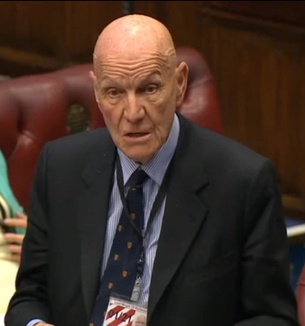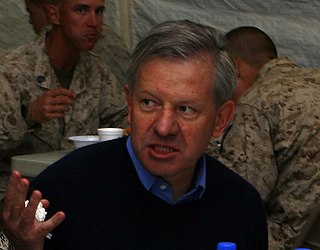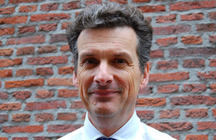Related Research Articles

The Middle East and North Africa (MENA), also referred to as West Asia and North Africa (WANA) or South West Asia and North Africa (SWANA), is a geographic region which comprises the Middle East and North Africa together. However, it is widely considered to be a more defined and apolitical alternative to the concept of the Greater Middle East, which comprises the bulk of the Muslim world. The region has no standardized definition and groupings may vary, but the term typically includes countries like Algeria, Bahrain, Egypt, Jordan, Kuwait, Lebanon, Libya, Morocco, Oman, Qatar, Saudi Arabia, Syria, Tunisia, the UAE, and Yemen.

Patrick Richard Henry Wright, Baron Wright of Richmond, was a British diplomat who served as Head of HM Diplomatic Service.

Sir Sherard Louis Cowper-Coles is a British former diplomat. He was the Foreign Secretary's Special Representative to Afghanistan and Pakistan in 2009–2010. After leaving the Foreign Office, he worked briefly for BAE Systems as international business development director. He left BAE Systems in 2013 and is now a senior adviser to the group chairman and the group chief executive of HSBC. He is also president of the Jane Austen Society.

Sir Geoffrey Doyne Adams served as the British Ambassador to Egypt from 2018 to 2021, as a member of the British Diplomatic Service. He was Ambassador to the Netherlands from 2013 to 2017.

Sir Dominic Anthony Gerard Asquith is a British career diplomat and former Ambassador to Iraq, Egypt, and Libya. He was First Secretary at the British Embassy in Washington DC. He was most recently the British High Commissioner to the Republic of India.

Mark Gregory Hambley is an American diplomat. During 32 years in the U.S. diplomatic service, Hon. Mark G Hambley served in fourteen different postings, many of them in Middle Eastern countries, including as U.S. Ambassador in Qatar and, later, in Lebanon and as the U.S. Consul General in Alexandria, Egypt, and in Jeddah, Saudi Arabia. Hambley was also posted in Saudi Arabia during the November 1979 Grand Mosque seizure. Other assignments took him to Vietnam, Yemen, Jordan, Tunisia and Libya during periods of war, coups, and civil unrest.
Sir Arthur John Wilton, known as John Wilton, was a British diplomat who was Ambassador to Kuwait (1970–1974) and to Saudi Arabia (1976–1979).
Sir Harold Beeley was a British diplomat, historian, and Arabist. After beginning his career as a historian and lecturer, following World War II, Beeley joined the British diplomatic service and served in posts and ambassadorships related to the Middle East. He returned to teaching after retiring as a diplomat and stayed active in many organisations related to the Middle East.

Sir William Charters Patey, KCMG is a British retired diplomat. He was British Ambassador to Afghanistan from 2010 to 2012, and previously served as Ambassador to Sudan, to Iraq and to Saudi Arabia.

The Assessment and Evaluation Commission (AEC) is a commission in the Republic of the Sudan that monitors and supports the implementation of the Comprehensive Peace Agreement (CPA). The AEC was charged to conduct a mid-term evaluation of the unity arrangements established.
Sir Willie Morris was a British diplomat from Yorkshire. He joined the Foreign Office in 1947 and retired in 1979.
The Office of the United Nations Special Coordinator for Lebanon UNSCOL is the political office of the United Nations that organizes the work of the UN in Lebanon. The Special Coordinator for Lebanon is the Secretary-General's representative to the Lebanese Government, as well as to all political parties and the broader diplomatic community hosted in the country. It has offices located in Yarze, three minutes from Beirut.

Brigadier-General Sir Gilbert Falkingham Clayton, was a British Army intelligence officer and colonial administrator, who worked in several countries in the Middle East in the early 20th century. In Egypt, during World War I as an intelligence officer, he supervised those who worked to start the Arab Revolt. In Palestine, Arabia and Mesopotamia, in the 1920s as a colonial administrator, he helped negotiate the borders of the countries that later became Israel, Jordan, Syria, Saudi Arabia and Iraq.
Sir Richard Ashton Beaumont was a British diplomat and Arabist who spent most his diplomatic career serving in the Arab world.

Raymond Arthur Hare was a United States diplomat who was Director General of the United States Foreign Service from 1954 to 1956 and Assistant Secretary of State for Near Eastern and South Asian Affairs from 1965 to 1966.
The Arab League has 22 member states. It was founded in Cairo in March 1945 with seven members: the Kingdom of Egypt, Kingdom of Iraq, Lebanon, Saudi Arabia, Syrian Republic, Transjordan, and North Yemen. Membership increased during the second half of the 20th century. Seven countries have observer status. The headquarters are located in Cairo, Egypt.

The Saudi National Security Council (SNSC) (Arabic: مجلس الأمن الوطني) was the body in charge of coordinating Saudi Arabia's national security, intelligence and foreign policy strategy. It was established in 2005 by King Abdullah bin Abdulaziz Al Saud. The first secretary general of the SNSC was Prince Bandar bin Sultan, the former Saudi Ambassador to the United States. The assistant secretary general of the SNSC was Prince Salman bin Sultan until 6 August 2013. The council was abolished by King Salman on 29 January 2015.

Sir John Jenkins is a British former diplomat who was ambassador to several countries.

Sir Nicholas Peter Kay is a British diplomat. He has served as the British ambassador to Afghanistan, Sudan and the Democratic Republic of the Congo. From 2013 to 2016 he was the United Nations Special Representative for Somalia.

The diplomatic relations between Lebanon and Saudi Arabia are the relationship between two Arab nations in the Middle East. Lebanon has an embassy in Riyadh and Saudi Arabia has one in Beirut.
References
- Curriculum Vitae of Sir Derek Plumbly. Assessment and Evaluation Commission web site. Retrieved 7 July 2009.
- Nkrumah, Gamal (10 August 2005). "Sir Derek Plumbly: Regional affiliations, and more". Al-Ahram. Archived from the original on 14 January 2009. Retrieved 11 January 2009.